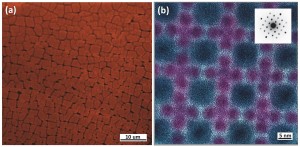Binary Nanoparticle Superlattices Formed from Highly Luminescent Core-Shell Quantum Dots and Their Photoluminescence Properties
- Category: Electronic Devices, Materials, Nanotechnology
- Tags: dong-kyun ko, efrc center for excitonics, vladimir bulovic

Figure 1. Large-area (1.5- x 1.5-cm Si/SiO2 substrate) binary nanocrystal superlattices (BNSLs) assembled from 8-nm CdSe/ZnS and 4-nm PbS/CdS core-shell QDs. (a) Fluorescence microscope image (1000x, 595-nm band filter) of BNSLs showing an average grain size of 3.2 um. (b) False color high-resolution transmission microscope (HRTEM) image and small-angle electron diffraction (CL 200 cm) pattern obtained from a single BNSL domain showing a formation of a cub-AB13 structure.
Colloidal semiconductor nanocrystals or quantum dots (QDs) offer size-tunable absorption and luminescence spectra, permitting a broad range of applications in optoelectronics and biomedical imaging. Advances in colloidal synthesis enable the preparation of monodispersed QDs, which can be further used as building blocks to direct self-assembly into closely packed superlattices with well-defined spatial coordination. Superlattices can also be formed from two different materials of QDs, often referred to as binary nanocrystal superlattices (BNSLs)[1],[2], providing an excellent materials platform to explore unique photophysical properties arising from electronic and optical interactions between two components.
In this work, we report for the first time BNSLs assembled from highly luminescent 8-nm CdSe/ZnS and 4-nm PbS/CdS core/shell QDs. Single superlattice domains with an average size of 3.2 μm show formation of cub-AB13 structures as confirmed by scanning electron microscopy, transmission electron microscopy, selective area electron diffraction, and structural modeling (Figure 1). We characterized these BNSLs optically via micro-photoluminescence spectroscopy of single superlattice domains formed on a Si/SiO2 substrate. We probed resonant energy transfer from CdSe/ZnS to PbS/CdS QDs, enabled by the spectral overlap of their emission and absorption spectra, respectively. A combination of spectral and time-resolved dynamics was used to elucidate differences in energy transfer between amorphous and ordered superlattice arrays; these differences will be further discussed in the context of a novel QD light-emitting diode. The spectral tunability of QDs combined with controlled nearest-neighbors and interparticle distances in their superlattice assemblies allow us to understand and potentially engineer excitonic energy flow in these unique material systems.
- E. V. Shevchenko, D. V. Talapin, N. A. Kotov, S. O’Brien, and C. B. Murray, “Structural diversity in binary nanoparticle superlattices,” Nature, vol. 439, pp. 55-59, Jan. 2006. [↩]
- S. A. Claridge, A. W. Castleman, S. N. Khanna, C. B. Murray, A. Sen, and P. S. Weiss, “Cluster-assembled materials,” ACS Nano, vol. 3, pp. 244-255, Feb. 2009. [↩]